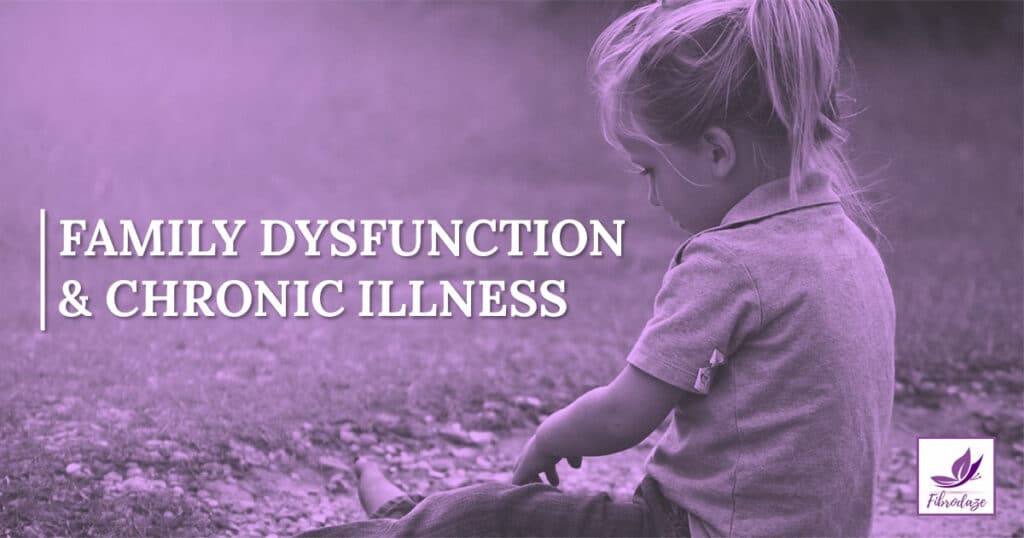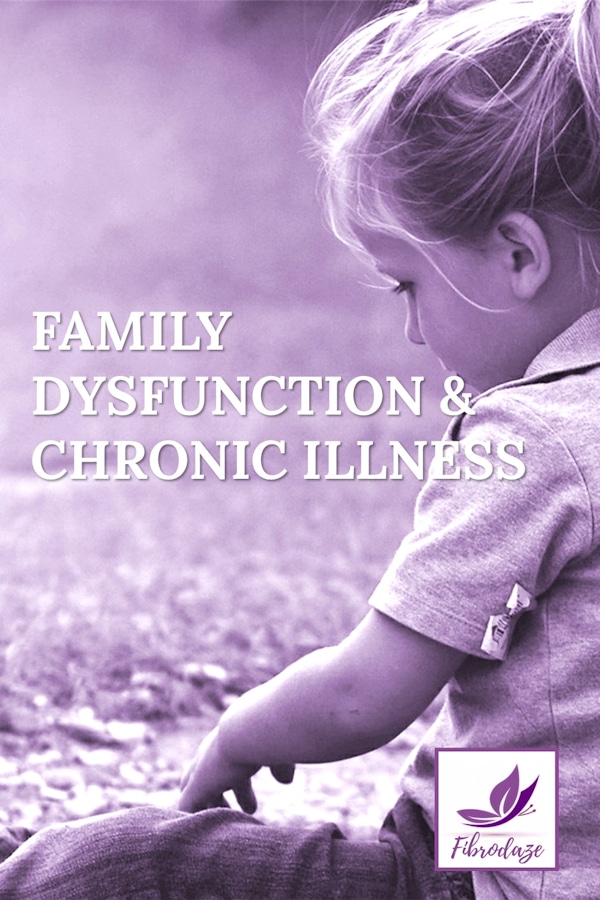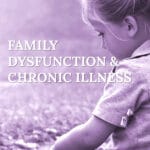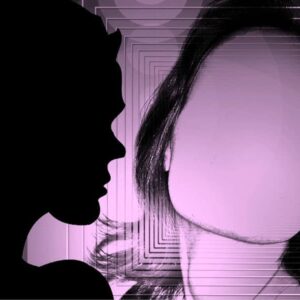Many people with an “invisible illness” don’t feel support from their own family. That can be especially true for those of us with fibromyalgia or chronic fatigue syndrome. How a family responds to chronic illness in large part is based on the strength and coping mechanisms of the family to begin with. The truth is, the lack of support and understanding I feel from my family has more to do with family dysfunction than my illnesses.

Since it is estimated that 96% of all families, are to some degree, dysfunctional, it would appear that this is the case for most of us. The isolation and lack of caring we feel from family may have always been there to some extent. Having a chronic illness just makes it more apparent and hard to ignore.
What Is Family Dysfunction
Family dysfunction is defined as: a family with multiple internal or external influences that affect the basic needs of the family unit.
These influences may include:
Internal Influences
- sibling rivalry
- parent-child conflict
- domestic violence
- mental illness
External Influences
- drug or alcohol abuse
- extramarital affairs
- gambling
- unemployment
Three internal and three external influences apply to me. It is why I sometimes wish I had used a pseudo name, instead of my real name on this blog. I live in a very small town so I find myself holding back when it comes to writing about personal things because it affects other people.
On the other hand, keeping my thoughts and feelings bottled up is not good for my physical or mental health.
Dysfunctional Family Child Roles
Children in dysfunctional families adopt particular roles which help them to manage and ease the pain. There are four basic roles that children adopt in order to survive growing up in a dysfunctional family system. Some children maintain one role into adulthood while others switch from one role to another as the family dynamic changes. An only child may play all of the roles at one time or another.
These four roles are:
- Hero – This is the child who may stand up against the aggressor or alcoholic to protect the other parent. As an adult, the hero can feel they need to be responsible for everybody and everything. They are often blind to their own personal needs.
- Scapegoat – The scapegoat is the child who unconsciously attracts the aggressors attention from another family member. In adult life, they may have a great sense of guilt, hatred, and resentment towards themselves and others. There is usually a kind soul is hidden behind this mask, but this is not known to themselves or to others.
- Lost Child – This child isolates themselves into their own world. They are quiet and withdrawn. They find it hard to trust someone. Traits like withdrawal and indecisiveness follow them into adulthood. The result can be a lack of understanding from those around them and isolation.
- Clown or Mascot – This child tries to be funny and comes up with all sorts of jokes to distract everyone from the real issues. As an adult, this person can make silly gestures, exhibit strange facial expressions and insert jokes off topic. They are hard to be taken seriously and often have problems with personal life.
All these roles mask the true self of a person. The more dysfunctional the family, the more complicated it is to get out of these roles.
I am a combination of the hero child and the lost child. Ironically these two child roles are the most likely to develop health problems. I’m not sure I was ever really a child at all. I felt a distorted sense of responsibility for the whole family from an early age. To cope with bearing adult responsibilities when I was far too young to do so, I cherished quiet alone time (still do).
Even as a child, I suffered migraines and had trouble sleeping. I was always so serious and as an adult I wasn’t able to enjoy life. I couldn’t enjoy anything good that happened for fear of losing it. I didn’t know how to be happy or what I wanted. The only thing that was clear to me is -what I didn’t want.
I was thirty-two years old when I decided I had to get help. I was depressed, couldn’t sleep and had a headache every single day. It took me three years of therapy to rid myself of those roles…to really know myself and learn what I needed to be happy.
How Family Dysfunction Affects Chronic Illness
Chronic negative stress increases our chances of becoming ill. Ample research demonstrates that psychological and social factors affect a person’s susceptibility to developing a chronic illness.
There are a number of studies on the influence of family and chronic illness. In most of these studies family dysfunction is associated with: poor coping of patients and family members, low adherence with medical treatments and adverse health outcomes.
Studies of stress and social support provide convincing evidence that family is the most important source of stress or support and has a potent impact on health.
Conclusion
Many people who grow up in dysfunctional families suffer internally which increases the risk of developing chronic illnesses. Family dysfunction can make coping with chronic illness more difficult.
One exacerbates the other, and both contribute to feelings of depression and anxiety.
Don’t be afraid or embarrassed to talk to your doctor if you are having trouble coping with your illness and have symptoms of depression. Seeing a therapist was the best thing I ever did. It not only helped me understand and deal with depression and family dysfunction, it made it easier to adapt to living with chronic illnesses.
I would love to hear your thoughts. Please leave a comment below.
Pin for Later






It must be difficult not having the support of family. I consider myself to be very lucky in that respect. I can see how family would be considered a big stress though if that wasn’t the case and I am sorry to read about your problems. I am glad you got the help you needed and that things are looking better now.
I understand what you mean about writing anonymously too. For a long time I didn’t “own” my blog, in that I felt uncomfortable around the fact my name etc was on it. However, now I just go for it. I do still feel embarrassed if people I know read it. I wish I could get over that feeling!
Thank you. I am so glad family is there for you.Cherish them. It wasn’t always this way. I did have family I was very close to, but sadly they passed away over the years. Since I wrote this post, I am starting to become more comfortable about…just going for it. I will face the embarrassment if it comes. LOL
It is amazing to me that 96% of all families, are to some degree, dysfunctional.
This post gave me, without much family understanding or support, some comfort. We need to stay strong for ourselves which is sometimes a challenge with chronic illness and seek the support of other who understand. Thanks Sue for your honesty. Xx
I was a bit shocked when I found out the statistics. It does seem to explain why society is the way it is today. Rationally, I know it is hard for people to understand what it is like. I am so grateful for the connections I have made online with you and others with chronic illness. It helps so much.
Hello, Thank you for the opportunity to share feelings about living with a chronic illness. I have an autoimmune disease and early 2011 I had to resign from my position because the fatigue I suffered was so severe I could no longer supervise young prep children without feeling like I was going to drop off to sleep. I had a duty of care to my students to give them them my undivided attention & I could no longer function effectively to do that.
That was 6 years ago and in that time no one in my family has come to my home and asked me about living with a chronic illness. Instead my parents, brothers, sister and eldest daughter have accused me of abusing drugs and just wanting pity. My father accused me of “just wanting to be sick” and both him and my mother asked me to provide evidence in writing from a Doctor.
Doctors have better things to do than write medical reports for parents who have no faith in their own daughter. All they need to do is look at the blood test results that I have here which proves I am not lying. For the past three years I have been suffering with reoccurring shingles. Shingles is extremely debilitating and considered one of the most painful adult diseases. In 2014 two Doctors misdiagnosed the first symptoms of shingles and I did not receive the antiviral medication within the first 72 hours. As a consequence I had a very severe case of shingles across my back, first on the left side, then on the right side. I now have postherpetic neuralgia across my back. When I am stressed the neuralgia flares and the pain I experience is a sharp burning pain that doesn’t respond well to normal analgesics.The side effects of anti seizure meds cause me to lose my balance & blurs my vision. As I live on my own I can not risk having a fall.
Reading this someone might perceive me to be a negative person however I am just stating a fact. It is not my job to prove to my family that I am telling the truth. My parents failed to tell me that I was prenatally exposed to thalidomide in the first trimester when my mother was pregnant with me. I was extremely fortunate not to have any obvious malformations which so many innocent people were born with throughout the world. I have compassion for all the babies who lost their lives, their mother’s and those who still suffer to this day due to prenatal exposure of a teratogen.
I was born in 1960 & in 1962 health professionals were made aware that thalidomide caused peripheral nerve damage and affected the thyroid. I have always suffered with painful feet and legs. As I age this symptom is getting worse. Someone decided that I was not worthy of any consideration. Even when I specifically asked my mother for any information about me from my early life, she chose to say nothing until early 2014. That is when she told me in detail about having severe morning sickness with me. I do not blame my mother for needing to take medication when she was pregnant with me. At the time people were told the anti nausea drug they were given was very safe. I do have compassion for her that she has carried a burden of guilt however I do not understand how my mother could see me suffering with various health problems, many of them painful, and not provide me with the information I my specialist Doctor asked for.
I feel betrayed by my parents for not telling me that I was exposed to a toxin before I was born. All my life I sensed that I was not treated the same as my brothers and sister. Scientific research has proven that emotional abuse & neglect of young children causes as much harm as physical abuse. I am plagued by nightmares from childhood experiences over & over.
To recover I am aware that I need to forgive my parents and move on. However these nightmares brought up by my subconscious are keeping me trapped reliving painful memories. I do not hear from my family anymore. They have decided that I am mentally unstable and need to be placed in psychiatric care.
A few months ago I received an email from my eldest daughter. She claimed that my family had a discussion regarding my future. Apparently it was decided that I need to sell my home, my horse and anything else here of value and buy a small unit that is walking distance to shops. They had gone so far as to find a place they believe would be suitable. It amazes me that my family went to all that trouble yet not one of them asked ME what would make me happy?
The thought of living somewhere where I could not even have my little dog scares me. I would be extremely unhappy as I have never been one to sit around watching TV & much prefer being outside. I feel like if it comes to that I may as well be dead.
The negative perception of my family is devastating for me. Both my parents and eldest daughter have earned prestigious awards for their community service. They are good people who have given a lot of their time to various charities. But when it comes to me that’s where their compassion stops. I am not a criminal and I always help other people when I can. Even now I am providing short term accommodation to a 32 year old mother & her two year old child. I do not expect or want any public acknowledgement for this but It would be nice if someone asked me if I was okay. It’s like some people are chosen to be givers & that role can not be changed. For me to be in a position when I have needed someone to see the truth of my situation has brought me a tirade of criticism, judgement and shame.
Thank you for bringing the challenges of living with a chronic illness to people’s attention. It is never easy and anyone who thinks it can be controlled by positive thinking alone has no right to judge someone else unless they have lived with a diagnosis and proven their belief to be true. Empathy heals NOT judgement.
Unless someone has walked in my shoes their criticism is not helpful at all. I say to them just shhhhhhh..
Michelle
Hi, Michelle. Thank you so much for sharing your story. I am so sorry you are treated this way. It is just shameful the way people with chronic illnesses are judged. It is worse when it is coming from your own family. You are right, it is not your job to prove to them you have a chronic illness. You have to live for you. I am praying that everything works out for you and you do not have to give up your home and especially your animals.
I know this post was written a little while ago, but thank you for taking the time to bear your heart and share this piece of information. I have a background in psychology and I also happen to have had a chronic illness blog for the past several years and planned on writing on this very topic. I wanted to google search and see if there was anyone else out there writing on family dysfunction and chronic illness. I’m so glad there is.